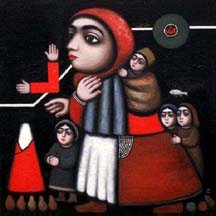|
Spring 1997 (5.1)
Einstein was a refugee along with untold millions of individuals throughout the ages. Here, we introduce a few of the many who have lived through the pain and uncertainty of exile and gone on to make extraordinary contributions to mankind's cultural and intellectual development. Albert Einstein (1879-1955) Thomas Mann (1875-1955)Winner of the Nobel Prize for Literature (1929), Thomas Mann fled Germany at about the same time as Einstein. Though Mann escaped to Switzerland for five years, he eventually ended up as Einstein's neighbor in Princeton, New Jersey.
Sigmund Freud (1856-1939) When Hitler's army attacked Austria, proclaiming union with Germany, Freud's friends insisted that he leave Vienna. He was 84 at the time and had lived in Vienna for 79 years. He obstinately resisted. "It would be like deserting, like a soldier quitting his post," he said. But finally there was little choice, and he fled to London where he died later that year. Ovid (43 B.C.-17 A.D.) No one is certain why Emperor Augustus banished Ovid from Rome to Tomus, a small village on the Black Sea at the edge of the Roman Empire which is located in present-day Romania. One version of the story says that Ovid's work "Ars Amatoria" ("The Art of Love") was considered too lewd and inappropriate; another, that the Emperor's action was politically motivated. Of his exile, he wrote, "Thrust among hostile people, I suffer every ill imaginable . . . No one is further from home than me." During his 8-year exile, Ovid completed "The Metamorphoses," a collection of stories about Greek and Latin mythology which both immortalized his name and heavily influenced European writers such as Shakespeare and Goethe. Dante (1265-1321) According to one source, Dante spent the rest of his life wandering around Italy "full of protest, at war with the world throughout his life, with no thought of surrender." But it was under these circumstances that he penned his ethical and political conception of the world. Today, he is esteemed as Italy's greatest poet. Frederic Chopin (1810-1849) Chopin is well known for his romantic piano music. Many of his expressive "mazurkas," "polonaises" and "nocturnes" are based on melodies from Polish folk music, which was his way of making a political statement. This sentiment appears in one of his letters to his family back in Poland: "You know how much I wanted to succeed in penetrating and making evident the deep feeling of our national music." Madeleine Korbel Albright
(1937- ) Albright went on to earn a Ph.D. from Columbia University and teach International Relations at Georgetown University. Under President George Bush, she was appointed U.S. Ambassador to the United Nations. In January 1997, President Clinton chose her to be Secretary of State. Political analysts anticipate that her childhood experiences as a refugee will make her sympathetic to the plight of individuals and nations which have suffered similar tragedies. Marc Chagall (1887-1985) Victor Hugo (1802-1885) Hugo writes of his experience there: "I love everything that suffers for freedom, for the fatherland and for justice; and I have peace of mind, even though it is always painful to tread on foreign soil." He did most of his writing and some of his best work during his 20-year exile there. He finally dared to return to Paris in 1870, only to have to flee again. Reflecting on his situation as a refugee, Hugo complained, "I don't even have the satisfaction of being oppressed by something great." Hugo was perceived as one of the most influential writers ever to shape French public opinion. When he was eventually able to return to Paris toward the end of his life, he was thronged in the streets by people cheering him, "Long live Victor Hugo!" Sitting Bull (1830-1890) Conflict broke out when the U.S. army invaded Sioux lands, supposedly protected by a treaty with the government. One of the most famous battles occurred in 1876, when George Custer and all of his soldiers were ambushed and killed by the Sioux. Retaliation by the U.S. government eventually resulted in the extinction of the buffalo upon which the Indians depended. In 1877, Sitting Bull led his hungry tribesmen into Canada where they remained for four years. In an emphatic statement to the U.S. government, he declared: "I want to have the white man with me, but not to be my chief . . . I want it to be seen and known that I have my rights." When another clash broke out in 1890, Sitting Bull died at the hands of police and soldiers while waiting to be rescued by his tribesmen. He is remembered as one of the greatest Indian leaders of North America. For more details, see the "Famous Refugees" series (1984-1989) published by UNHCR in their magazine, "Refugees." Dominique Miyet in UNHCR's Geneva office also assisted with this article. From Azerbaijan International (5.1) Spring 1997. Back to Index
AI 5.1 (Spring 1997) |


